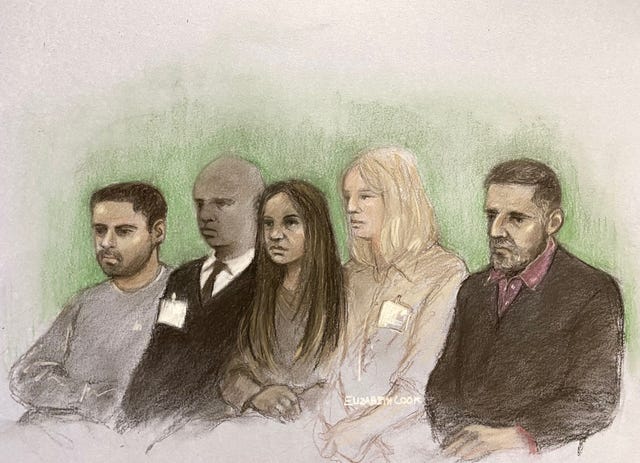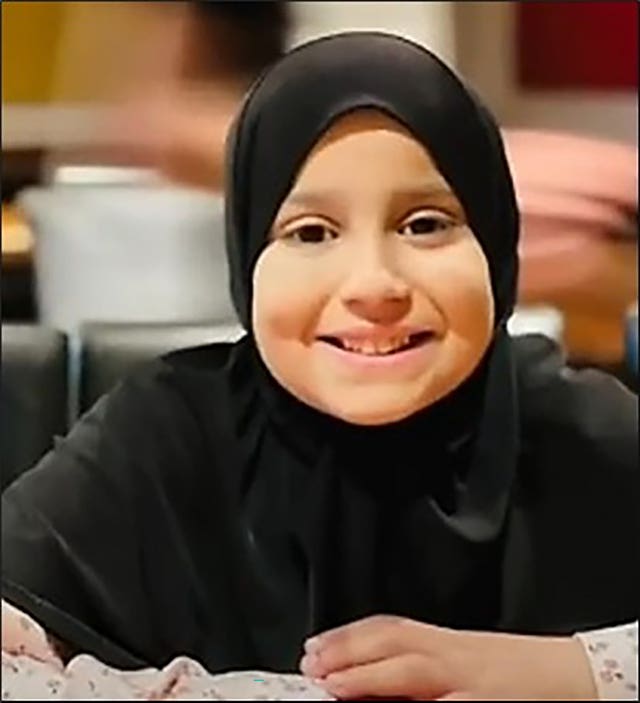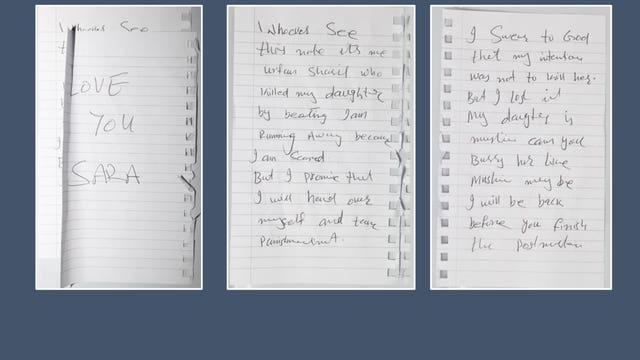Sara Sharif had multiple unexplained fractures in 25 locations on her body which were most likely caused by “multiple episodes of blunt force trauma inflicted over several weeks”, a court has heard.
Jurors were told previously the 10-year-old had suffered more than 70 injuries shortly before she was found dead in her home in Woking, Surrey, on August 10 last year.
Sara’s father Urfan Sharif, 42, is on trial at the Old Bailey accused of his daughter’s murder, alongside Sara’s stepmother Beinash Batool, 30, and uncle, Faisal Malik, 29.

On Friday, consultant paediatric radiologist, Professor Owen Arthurs, told jurors there were “multiple unexplained fractures in 25 locations” on Sara’s body.
He told the court: “My opinion of most of the fractures in this case… were that they were very unusual and they cannot be explained by an accidental mechanism nor can they be explained as any single high impact trauma event.”
He highlighted fractures to Sara’s hyoid in her neck, the vertebrae in her spine and her hand in particular.
The professor said a fracture to the hyoid is “extremely rare”, adding: “I have not ever seen a hyoid fracture in a child even in those where we have a very good history of ligature strangulation (hanging).
“The most likely case here is manual strangulation with a degree of force above that which we would commonly recognise in ligature strangulation – hanging.”

Of the fractures in her spine, Prof Arthurs said they were likely caused by “high velocity impact or multiple trauma”, that spinal fractures are “very rare” and usually caused by road traffic accidents or falling from a height.
There were also fractures to Sara’s right clavicle, both shoulder blades, ribs and right elbow, the court heard.
“There is no evidence that Sara was suffering from any underlying bone abnormality as far as the imaging is concerned,” Prof Arthurs told jurors.
“My opinion is that the most likely explanation for the constellation of injuries – including location, pattern, severity, healing pattern and some refractures – are multiple episodes of blunt force trauma inflicted over several weeks.”
X-Ray images of the different fractures were shown in court and jurors heard estimations of when each injury occurred – ranging from less than 10 days to 12 weeks before Sara’s death.
Earlier in the trial, jurors heard that a pathologist who carried out a post-mortem examination on Sara’s body gave the girl’s cause of death as “complications arising from multiple injuries and neglect”.

Police found Sara’s body in a bunk bed in her home, following a call from Sharif in Pakistan saying he “beat her up too much” for being “naughty”, the court has heard.
It is alleged Sara had died two days before and the defendants had booked flights out of the country within hours of her death.
Forensic pathologist Dr Nathaniel Cary previously told the court that some of Sara’s external injuries, which included dozens of bruises, grazes and burns, were the result of “repetitive blunt trauma” and “blunt impact or solid pressure, or both”.
Her injuries included significant damage internally, including bleeding on her brain, multiple bruises on her lungs and multiple skeletal injuries, jurors were told.
No natural diseases or drugs had contributed to Sara’s death, the court heard.

Previously, the prosecution told jurors the 10-year-old had suffered “probable human bite marks”, a burn from a domestic iron and scalding from hot water.
Traces of the schoolgirl’s blood were discovered on the kitchen floor, a vacuum cleaner and a cricket bat following a police search of the family home along with “homemade hoods” used to restrain her, the prosecution said.
All three defendants, of Hammond Road in Woking, have denied murder and causing or allowing the death of a child between December 16 2022 and August 9 2023.
The trial continues on Monday.




Comments: Our rules
We want our comments to be a lively and valuable part of our community - a place where readers can debate and engage with the most important local issues. The ability to comment on our stories is a privilege, not a right, however, and that privilege may be withdrawn if it is abused or misused.
Please report any comments that break our rules.
Read the rules hereComments are closed on this article